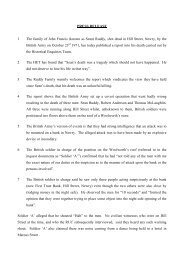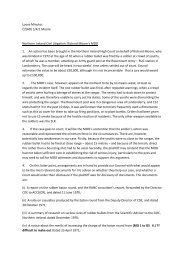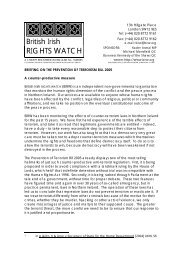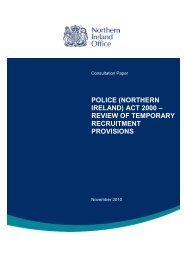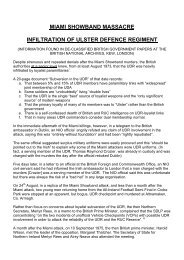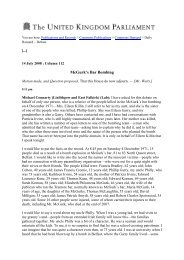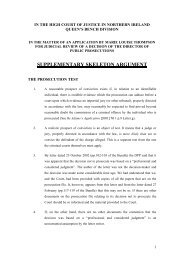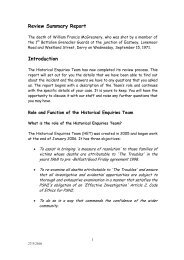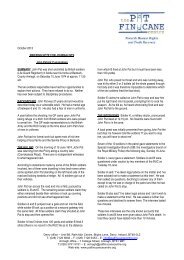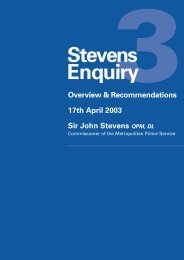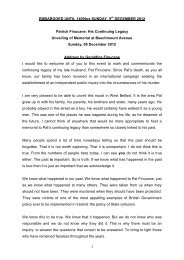Patrick Shanaghan v the United Kingdom - The Pat Finucane Centre
Patrick Shanaghan v the United Kingdom - The Pat Finucane Centre
Patrick Shanaghan v the United Kingdom - The Pat Finucane Centre
Create successful ePaper yourself
Turn your PDF publications into a flip-book with our unique Google optimized e-Paper software.
26 SHANAGHAN v. THE UNITED KINGDOM JUDGMENT<br />
bodies, to ensure <strong>the</strong>ir accountability for deaths occurring under <strong>the</strong>ir<br />
responsibility. What form of investigation will achieve those purposes may<br />
vary in different circumstances. However, whatever mode is employed, <strong>the</strong><br />
authorities must act of <strong>the</strong>ir own motion, once <strong>the</strong> matter has come to <strong>the</strong>ir<br />
attention. <strong>The</strong>y cannot leave it to <strong>the</strong> initiative of <strong>the</strong> next of kin ei<strong>the</strong>r to<br />
lodge a formal complaint or to take responsibility for <strong>the</strong> conduct of any<br />
investigative procedures (see, for example, mutatis mutandis, İlhan<br />
v. Turkey [GC] no. 22277/93, ECHR 2000-VII, § 63).<br />
89. For an investigation into alleged unlawful killing by State agents to<br />
be effective, it may generally be regarded as necessary for <strong>the</strong> persons<br />
responsible for and carrying out <strong>the</strong> investigation to be independent from<br />
those implicated in <strong>the</strong> events (see e.g. Güleç v. Turkey judgment of 27 July<br />
1998, Reports 1998-IV, §§ 81-82; Öğur v. Turkey, [GC] no. 21954/93,<br />
ECHR 1999-III, §§ 91-92). This means not only a lack of hierarchical or<br />
institutional connection but also a practical independence (see for example<br />
<strong>the</strong> case of Ergõ v. Turkey judgment of 28 July 1998, Reports 1998-IV,<br />
§§ 83-84, where <strong>the</strong> public prosecutor investigating <strong>the</strong> death of a girl<br />
during an alleged clash showed a lack of independence through his heavy<br />
reliance on <strong>the</strong> information provided by <strong>the</strong> gendarmes implicated in <strong>the</strong><br />
incident).<br />
90. <strong>The</strong> investigation must also be effective in <strong>the</strong> sense that it is capable<br />
of leading to a determination of whe<strong>the</strong>r <strong>the</strong> force used in such cases was or<br />
was not justified in <strong>the</strong> circumstances (e.g. Kaya v. Turkey judgment, cited<br />
above, p. 324, § 87) and to <strong>the</strong> identification and punishment of those<br />
responsible. This is not an obligation of result, but of means. <strong>The</strong> authorities<br />
must have taken <strong>the</strong> reasonable steps available to <strong>the</strong>m to secure <strong>the</strong><br />
evidence concerning <strong>the</strong> incident, including inter alia eye witness<br />
testimony, forensic evidence and, where appropriate, an autopsy which<br />
provides a complete and accurate record of injury and an objective analysis<br />
of clinical findings, including <strong>the</strong> cause of death (see concerning autopsies,<br />
e.g. Salman v. Turkey cited above, § 106; concerning witnesses e.g.<br />
Tanrõkulu v. Turkey [GC], no. 23763/94, ECHR 1999-IV, § 109; concerning<br />
forensic evidence e.g. Gül v. Turkey, no. 22676/93, [Section 4], § 89). Any<br />
deficiency in <strong>the</strong> investigation which undermines its ability to establish <strong>the</strong><br />
cause of death or <strong>the</strong> person responsible will risk falling foul of this<br />
standard.<br />
91. A requirement of promptness and reasonable expedition is implicit<br />
in this context (see <strong>the</strong> Yaşa v. Turkey judgment of 2 September 1998,<br />
Reports 1998-IV, pp. 2439-2440, §§ 102-104; Cakõcõ v. Turkey cited above,<br />
§§ 80, 87 and 106; Tanrikulu v. Turkey, cited above, § 109; Mahmut Kaya<br />
v. Turkey, no. 22535/93, [Section I] ECHR 2000-III, §§ 106-107). It must<br />
be accepted that <strong>the</strong>re may be obstacles or difficulties which prevent<br />
progress in an investigation in a particular situation. However, a prompt<br />
response by <strong>the</strong> authorities in investigating a use of lethal force may



